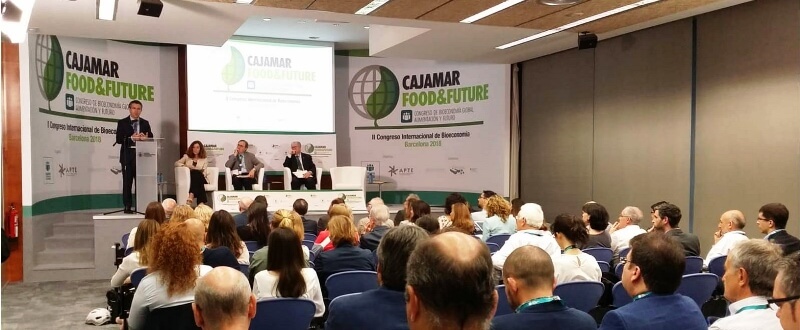
Bioeconomy experts warn of the need for sustainable use of biological resources
Around 150 investigators, technicians and entrepreneurs attended the Barcelona Science Park’s (PCB) auditorium today as part of the 2nd International Bioeconomy Congress, jointly organised by Cajamar and the Association of Science and Technology Parks of Spain (APTE), in collaboration with the PCB and the Lleida Agri-food Science and Technology Park (PCiTAL).
The strategies for designing a new economic non-petrol model through the efficient use of available biological material, profiting from farming and industrial sub-products and the use of new forms of sustainable energy is an increasingly common goal in the productive tissue of Spain. Year after year, more businesses are opting for the efficient use of natural resources. Due to this, and in response to the need to create an interdisciplinary collaboration space to promote and raise awareness about technological advancements, APTE and Cajamar started working together in the organisation of biennial bioeconomy meetings and congresses two years ago.
In the opening ceremony, Cajamar’s president, Eduardo Baamonde, stated that in our nearest neighbours, the European Union, bioeconomy is already starting to become a reality. As a whole, its different constituent parts generate an annual business turnover of more than two trillion euros, providing employment to over 22 million people.
“In Spain”, he indicated, “the weight of the agro-food sector alone, the diversity of our offerings, their sophistication, the vast range of agents involved in the network and their environmental determinants make Spain an ideal country for the development of many of the most advanced premises of bioeconomy in a range of areas. This is especially true for those which are more dynamic and have a greater inclination to undertaking and incorporating R&D&I in their business model, such as the intensive agriculture sector”.
Meanwhile, APTE president, Felipe Romera, stressed the role of science and technology parks as “the motors of future technologies and drivers of emerging sectors, such as bioeconomy, which help economic and social development in Spain”. In this regard, it was necessary for the 51 operating parks to increase their number of businesses to 8,000, which turned over 27 billion euros and provided employment to 170,000 individuals. He added, “One of the most important aspects is that employment in research and development (R&D) activities, which represents 20% of total employment, has increased by almost 13% since 2016”.
Important national and international representatives, who have provided a global image of the current situation of the bioeconomy and its different applications, attended the Congress. The speeches were divided into two groups. One was of an institutional nature based on analysing current policies which promote the set of disciplines composing the bioeconomy and how they can be transferred to the reality of business. The other was of a technical-economic nature and dedicated to the future of agri-food by looking at the various challenges faced by this sector, which will have repercussions in the development of various economic areas.
The second session of the Congress consisted of two round-table discussions in which representatives of innovative SMEs, consolidated businesses and start-ups shared their knowledge and experiences and discussed the challenges facing the business framework in the implementation of this new manner of generating value in the final product. ►Account of the 2nd International Bioeconomy Congress [+info]
Science and technology parks provide jobs to 170,000 individuals
A total of 40 representatives of APTE member parks met yesterday at the Barcelona Science Park to celebrate the 2nd General Assembly of the association in 2018, in which the annual statistics report on the activity of the businesses located in Spanish science and technology parks was presented, yielding very positive figures for the last financial year.
The APTE member parks ended the last financial year with a total of 8,013 businesses and entities located on their premises, which constitutes a 2.89% increase compared to the previous year. Out of all the businesses, 345 are under foreign ownership and 963 are in incubation and less than 3 years old. The parks also were composed of 931 entitles, including newly-created businesses and those that are located in the parks.
Employment has also significantly improved, with the number of park employees increasing by 4.95%, equating to 169,337 employees. Of these, 34,161 are specialists in research and development (R&D) tasks, which constitutes an increase of almost 13% compared to 2016.
The companies’ turnover has also seen a very significant improvement compared to last year, reaching a total of 27.043 billion euros—a 3.72% increase on 2016.
Likewise, over the course of 2017, the parks accumulated an investment of 1.072 billion euros in R&D activities; a figure which, however, has decreased since the previous year.
The ranking of productive sectors where the parks bring together the greatest number of companies continues to be led by the ICT sector, with a share of 23.1% of the companies. This is followed by the Engineering and Consultancy sector, with 19.2%, and the Medicine and Health sector with 6.1%. ► Account of the 2nd APTE General Assembly [+info]




